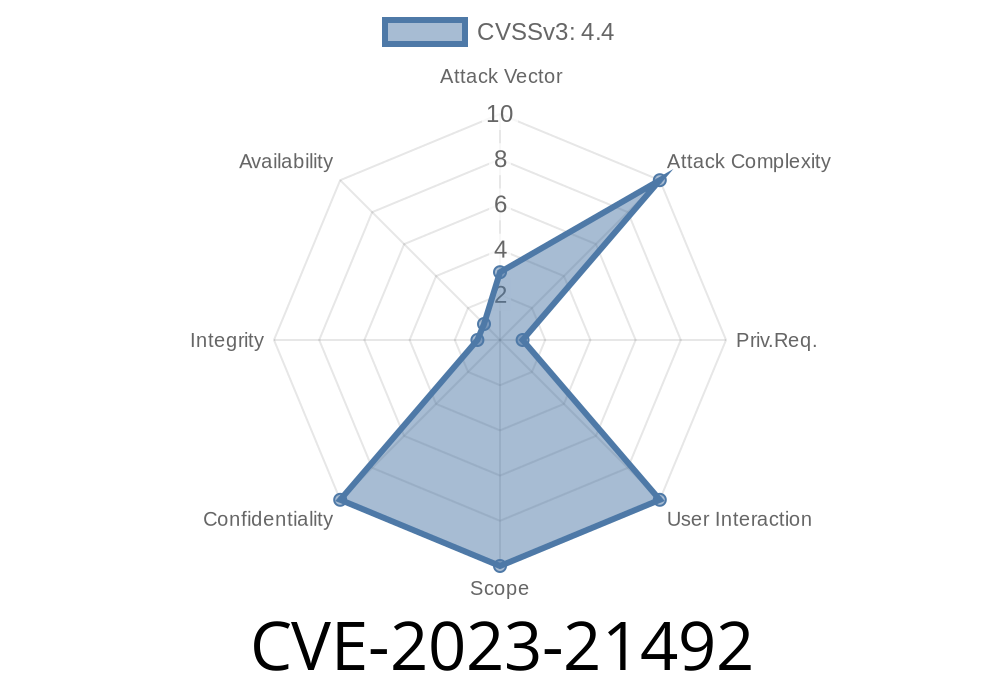The vulnerability CVE-2023-21492 was patched by Samsung in the SMR (Samsung Mobile Release) May-2023 Release 1. But before this fix, a serious flaw allowed privileged local attackers to read sensitive kernel pointers from log files. Attackers could use this to bypass ASLR (Address Space Layout Randomization) – a key security defense. Let’s dive deep into what happened, how it could be exploited, and share some practical examples and resources.
What Is CVE-2023-21492?
This vulnerability affected the Android kernel on Samsung devices. Due to improper logging, kernel memory addresses (pointers) were written to system log files. Privileged users (think root or an app with debug permissions) could read logs and use leaked addresses to predict where kernel code and data live in memory. This negates ASLR, making it much easier to launch further attacks like arbitrary code execution or privilege escalation.
Reference:
- Samsung Security Updates - May 2023
- MITRE CVE Entry
Why Is ASLR Important?
ASLR randomizes important memory regions in every boot or process start. Without it, critical sections (like the kernel, libraries, or the stack) always live at the same spot in RAM – attackers can plug in static addresses to exploit a bug. If an attacker knows where the kernel is mapped (via a leaked pointer), they can craft reliable exploits.
How Were Kernel Pointers Leaked?
Before the May-2023 patch, some debugging or error logs, like those written by common drivers, dumped internal data structures directly to logs. These structure fields often included *kernel virtual addresses*.
Example Log Entry (Simplified)
[ 121.061223] my_driver: Request failed, buf @ xffffffc002123456, len x100
This line gives the attacker the exact location of an in-memory buffer inside the kernel. With a few such leaks, the randomization offered by ASLR is lost.
Exploit Scenario: Using the Leak
Let’s say a (malicious) app has *log reading* privileges (e.g. it runs as root or it’s a debugging tool). The app scrapes log files and harvests kernel addresses:
Python Demo: Extracting Leaked Kernel Pointers
Below’s a simple example for educational purposes. (Do not use this for hacking — only for responsible security testing.)
import re
# Simulate log file content containing kernel pointers
log_content = """
[ 121.061223] my_driver: Request failed, buf @ xffffffc002123456, len x100
[ 130.561223] another_driver: Warning @ ptr xffffff800013aa00
"""
# Regex pattern for a 64-bit kernel address
ptr_pattern = re.compile(r'x[-9a-f]{16}')
pointers = ptr_pattern.findall(log_content)
print("Kernel pointers found in logs:")
for ptr in pointers:
print(ptr)
Expected Output
Kernel pointers found in logs:
xffffffc002123456
xffffff800013aa00
The attacker collects these addresses. Now, if they have another vulnerability (say, buffer overflow or arbitrary write), they can target the real, ASLR-defeated kernel addresses without guesswork. This massively boosts their chance of further exploitation.
Why Is This Dangerous?
- Bypass Defense: ASLR is often the *only* protection between a non-critical info leak and full system takeover.
- Privilege Escalation: Leaked addresses make it much easier to exploit other, more serious bugs (like privilege escalation, root access, etc.).
- Widespread: Any app with the right permissions (like a debug app or root shell) becomes a potential attack vehicle.
How Did Samsung Fix It?
Starting in May 2023 (Release 1), Samsung’s patches scrubbed kernel pointer data in log messages — either filtering them out or converting pointers into safe, non-revealing tokens (like “(pointer)”).
From then onward, logs don’t contain direct kernel addresses, keeping ASLR effective.
More References
- Samsung Product Security Notices Archive
- Full CVE List (NIST)
- Simple Guide to ASLR
- ASLR Bypass Using Info Leak (Google Project Zero)
Final Thoughts
CVE-2023-21492 is a classic reminder: even “just” an information leak can undermind deep security. Kernel pointers in logs (+ a small bug somewhere else) = *root in your pocket*. Always keep devices patched, watch app permissions, and remember: those logs might know more than you think!
Stay safe.
*This article is original content and simplifies complex security for all tech readers. Curious about another CVE? Drop a comment!*
Timeline
Published on: 05/04/2023 21:15:00 UTC
Last modified on: 05/10/2023 18:25:00 UTC
